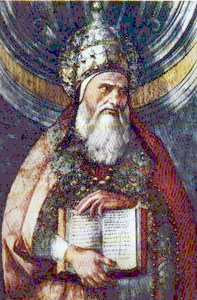 Saint Pius I
Saint Pius I
Pope and Martyr († 157)
St. Justin Martyr, also known as Justin the Philosopher, an early Christian apologist, through his passionate defense of the morality of the Christian life, and by using various ethical and philosophical arguments was able to convince Emperor Antoninus Pius to abandon the persecution of the Church. Emperor Antoninus became known as one of the “5 Good Emperors” and his reign in Rome (from 138 to 161), was the most peaceful reign in the entire history of the Principate.
Once the immediate danger from civil authority was lifted the Church started to flourish, but not all was well. Numerous heresies attempted to infiltrate the Church. Gnosticism was perhaps the most dangerous heresy during the first three centuries. Gnosticism comes from the Greek word gnosis which means “to know.” Gnostics influenced by such philosophers as Plato claimed to possess a higher knowledge acquired not from the Bible, but on some mystical higher plane of existence. They see themselves as a privileged class elevated above everybody else by their higher, deeper knowledge of God which is a principal element of salvation.
Gnosticism espouses a dualism regarding spirit and matter. Matter is inherently evil, and spirit is good. As a result of this presupposition, they believe anything done in the body, even the grossest sin, has no meaning because real life exists in the spirit realm only.
In such an environment, in 142 AD, St. Pius I was called to succeed Pope St. Hyginus and was in charge of growing the Church and protecting the purity of Her teachings as the ninth successor to St. Peter.
Pius is believed to have been born at Aquileia in Northern Italy, during the late first century. His father was called Rufinus, and he was the brother of St. Hermas, author of the apocalyptic text known as The Shepherd, which urged the church to purify itself in preparation for the imminent Second Coming of Christ. Since St. Hermas identifies himself as a former slave, it is presumed that both St. Hermas and St. Pius I were freedmen.
Throughout his pontificate he took great care to make the religion of Christ flourish, and published many beautiful ordinances for the utility of the universal Church. He ordained that Easter be celebrated on a Sunday; in this way the custom which the Apostles had already observed became an inviolable law of the Church. He was welcoming to heretics if they renounced their heresy, but was severe towards blasphemers and with clergy who showed negligence for the divine Mysteries of the altar.
During St. Pius’ time the heretics Valentinus, Cerdon, and Marcion were actively teaching the Gnostic doctrine in Rome. Marcion, a wealthy shipbuilder, founder of a heretical group which bears his name, was excommunicated after proclaiming that Old Testament scriptures were not valid because the Jewish deity who inspired them was an inferior, wrathful being, very different from the True God who was the Heavenly Father of Jesus. By excommunicating Marcion, St. Pius I established the Christian tradition to recognize the Jewish and Christian deities as one and the same God and created the foundation for accepting the Old Testament into the later Christian canon of scripture. In his time, the Roman church appears to have begun to assume a defining role in establishing Christian doctrine, not only by later reputation, but also in actual practice.
As an administrator St. Pius I set the foundation of two major Roman churches, the Santa Pudenziana and the Titulus Praxedis, which were replaced by current one in fourth century.
After having governed the Church for fifteen years Saint Pius I obtained the crown of martyrdom by the sword, in the year of Our Lord 150.
References and Excerpts:
[1] “Saint Pius I, Pope and Martyr.” https://sanctoral.com/en/saints/saint_pius_i.html (accessed Jul. 01, 2021).
[2] “Pope Pius I – New World Encyclopedia.” https://www.newworldencyclopedia.org/entry/Pope_Pius_I (accessed Jul. 01, 2021).